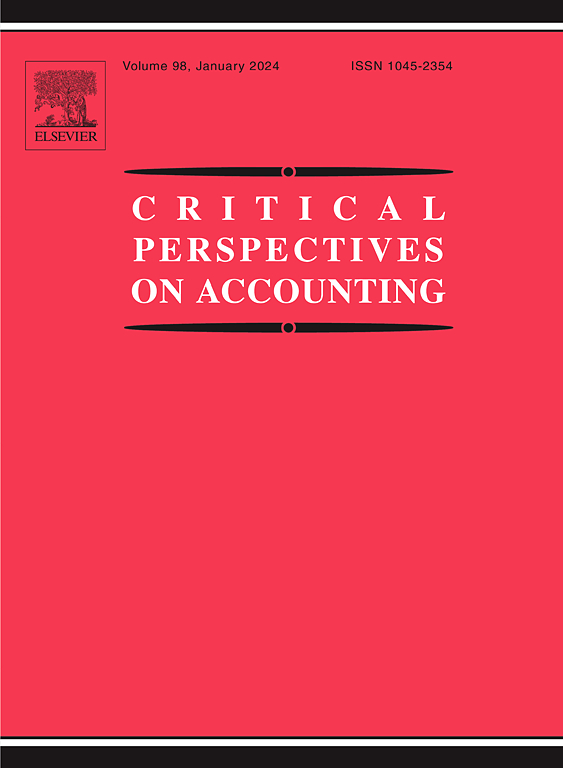内化负责任的财务行为:美国老年人的自我决定
IF 5.7
2区 管理学
Q1 BUSINESS, FINANCE
引用次数: 0
摘要
在金融化的日常生活中,人们期望个人对自己的金融未来负责。然而,作为人口中不断增长的一部分,老年人面临着国家资源问题、不断发展的退休和养老金制度以及其他金融安全威胁(例如,市场和其他危机),这些都给满足这些期望带来了挑战。通过23个半结构化访谈,我们调查了美国老年人如何代表他们的金融行为与他们的金融经历。利用自我决定理论,我们发现老年人将他们的财务行为表现为“负责任的”,这是基于对自主性、能力和相关性的基本需求。在形成负责任的财务行为时,老年人将自己表现为自主的主体,在财务上照顾自己,而不是经济上的“负担”。在内化这些行为的过程中,我们发现老年人传达了一系列的计算实践和会计技术,这些实践和会计技术是他们一生中遇到的负责任的财务行为和金融化趋势的基础。人们对金融行为的认知并非纯粹受到内在或外在的驱动,而是受到个人所面临的社会经济体系的推动和约束。本文章由计算机程序翻译,如有差异,请以英文原文为准。
Internalizing responsibilized financial behavior: Self-determination among older individuals in the United States
In their financialized daily lives, individuals are expected to take responsibility for their financial futures. Yet, as a growing segment of the population, older individuals face questionable state resources, evolving retirement and pension systems, and other threats to financial security (e.g., market and other crises) that present challenges to meeting such expectations. Using 23 semi-structured interviews, we investigate how older individuals in the United States represent their financial behaviors relative to their financial experiences. Using self-determination theory, we find that older individuals represent their financial behaviors as ‘responsibilized’ based on fundamental needs for autonomy, competence, and relatedness. In their formation of responsibilized financial behaviors, older individuals present themselves as self-determined subjects who take care of themselves financially and are not a financial ‘burden’. In internalizing such behaviors, we find that older individuals convey a range of calculative practices and accounting technologies that underlie their responsibilized financial behaviors and financializing trends encountered throughout their lives. Rather than being purely intrinsically or extrinsically motivated, perceptions of financial behaviors appear as both enabled and disciplined by the socioeconomic system that individuals face.
求助全文
通过发布文献求助,成功后即可免费获取论文全文。
去求助
来源期刊

Critical Perspectives on Accounting
BUSINESS, FINANCE-
CiteScore
9.40
自引率
7.80%
发文量
91
期刊介绍:
Critical Perspectives on Accounting aims to provide a forum for the growing number of accounting researchers and practitioners who realize that conventional theory and practice is ill-suited to the challenges of the modern environment, and that accounting practices and corporate behavior are inextricably connected with many allocative, distributive, social, and ecological problems of our era. From such concerns, a new literature is emerging that seeks to reformulate corporate, social, and political activity, and the theoretical and practical means by which we apprehend and affect that activity. Research Areas Include: • Studies involving the political economy of accounting, critical accounting, radical accounting, and accounting''s implication in the exercise of power • Financial accounting''s role in the processes of international capital formation, including its impact on stock market stability and international banking activities • Management accounting''s role in organizing the labor process • The relationship between accounting and the state in various social formations • Studies of accounting''s historical role, as a means of "remembering" the subject''s social and conflictual character • The role of accounting in establishing "real" democracy at work and other domains of life • Accounting''s adjudicative function in international exchanges, such as that of the Third World debt • Antagonisms between the social and private character of accounting, such as conflicts of interest in the audit process • The identification of new constituencies for radical and critical accounting information • Accounting''s involvement in gender and class conflicts in the workplace • The interplay between accounting, social conflict, industrialization, bureaucracy, and technocracy • Reappraisals of the role of accounting as a science and technology • Critical reviews of "useful" scientific knowledge about organizations
 求助内容:
求助内容: 应助结果提醒方式:
应助结果提醒方式:


